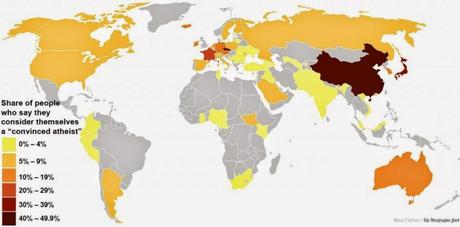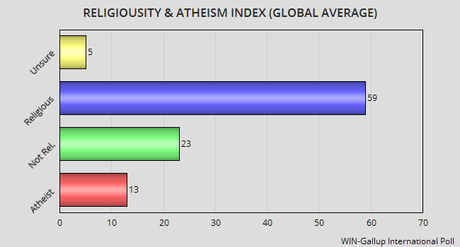In our modern world with vast and instant forms of communications, resources and views; it is very important to understand the definitions of words that are discussed and that affect the topic of conversation. This three part report will look at certain definitions, why they are grouped in secularism, and statistics in Part 1. Then Part 2 explores the agendas and changes made to public schools and organizations; and affects to government policy.
Definitions (1828 Webster’s Dictionary; Oxford and Cambridge Dictionaries)
Agnostic: A person who believes that nothing is known or can be known of the existence or nature of God… In a non-religious context having a doubtful or non-committal attitude… Mid 19th century origin from a-‘not’ + gnostic (relating to mystical knowledge).
Atheist: One who disbelieves the existence of a God, or Supreme intelligent Being.
Atheism: Disbelief or lack of belief in the existence of God or gods. Origin from late 16th century: from French athéisme, from Greek atheos, from a-‘without’ + theos ‘god.’
Christian: 1. A believer in the religion of Christ. 2. A professor of belief in the religion of Christ. 3. A real disciple of Christ; one who believes in the truth of the Christian religion, and studies to follow the example, and obey the precepts, of Christ… belonging to the religion of Christ…
Christianity: The religion based on the person and teachings of Jesus Christ. Middle English: from Old French crestiente, from crestien ‘Christian’, influenced by late Latin christianitas, from Latin Christianus, from Christus ‘Christ’.
Non-religious: Not relating to or believing in a religion.
Secular: Latin secularis, from speculum, the world or an age. 1. Pertaining to the present world, or to things not spiritual or holy; relating to things not immediately or primarily respecting the soul, but the body; worldly. The secular concerns of life respect making provision for the support of life, the preservation of health, the temporal prosperity of men, of states, etc. Secular power is that which …governs the temporal affairs of men, the civil or political power; and is contradistinguished from spiritual or ecclesiastical power… Not connected with religious or spiritual matters. Used in Christian Latin to mean ‘the world’ as opposed to the Church.
Secular humanism: A set of beliefs that emphasize the importance of reason and of people rather than religion.
Secularize: When something is secularized, religious influence, power or control is removed from it.
Secularizing: Converting from regular or monastic to secular.
Secularism: The principle of separation of the state from religious institutions. The belief that religion should not be involved with the ordinary social and political activates of a country.
Why Atheists, Agnostics & Non-religious are grouped with Secularism?
There are several reasons why atheists, agnostics and non-religious are and should be grouped under the universal heading of secularism or secularists. In the most practical or general sense, they all denied faith or belief in the Lord God Almighty, Creator of the Universe; and in the Lord Jesus Christ, the Word and Son of God. “In the beginning was the Word, and the Word was with God, and the Word was God… All things were made through Him… In Him was life, and the life was the light of men. And the light (Word and Spirit of God) shines in the darkness, and the darkness comprehends it not… He (Jesus Christ; the Light) was in the world, and the world was made through Him, and the world did not know Him… and did not receive Him… The Light has come into the world, and men loved darkness rather than light… (Gospel of John; from chapter 1 and 3).“ Thus, they are part of the ‘world’ or ‘worldly’ who ‘do not know’ and or reject Christ (Christianity).
Additionally, the Council for Secular Humanism (secularhumanism.org) states in its article Curious about Secular Humanism (2017), “…If you’ve rejected traditional religion, you may be asking, ‘is that all there is?’ …For many, mere atheism (the absence of belief in gods and the supernatural) or agnosticism (the view that such questions cannot be answered) aren’t enough. …As social beings sharing a godless world, how should we coexist? For the questions that remain unanswered after we’ve cleared our minds of gods and souls and spirits, many atheists, agnostics, skeptics and freethinkers turn to secular humanism.”
Even the title of their conventions shows they are secular: “The Secular AA 2016 Convention” in Austin by AA Agnostica (“for AA agnostics, atheists and freethinkers worldwide”).
It is natural that individuals from these groups that search for strength and or meaning would join together. Though the goals of the International Academy of Humanism may be slightly different from the goals of the American Atheists, Freedom from Religion Foundation or Atheist Alliance International, they all seek to separate Christianity from the public (and many private) sectors of the world – thus, seeking to control the academic/education/experience of all society. Their goals and doctrine typically then support freedom for groups such as GLBT to influence school and society policies, while at the same time restricting the same freedoms for Christians. In order words; the beliefs, morals and legal desires of one group (against Christian Bible reading, prayer and gay conversion therapy; pro-evolution; pro-choice, etc.) in public schools and laws – the primarily battleground for the children and young future leaders/teachers/etc. – are held above the beliefs, morals and desires of the other (for the commands of God, against same-sex marriage, pro-creationism, pro-life, etc.).
According to the co-chairs (Bouchard-Taylor) of Canada’s Consultation Commission on Accommodation Practices Related to Cultural Differences (2007), “…we cannot grasp secularism through simple, unequivocal formulas such as ‘the separation of Church and State,’ ‘State neutrality towards religious’ or ‘the removal of religion from public space,’ even through all of these formulas contain part of the truth.” The Commission found a “strict” or “rigid” conception of secularism would accord more importance to the principle of neutrality than to freedom of conscience and religion, attempting to relegate the practice of religion to the private and communal sphere, leaving the public sphere free of any expression of religion. However, the truth is it is not neutrality, because Christians are not allowed to share their truths and doctrines in the same matter. As a matter of fact, Canada now has laws that are against Christianity or the laws of Christ; such as Bill 89, the Supporting Children, Youth and Families Act (2017) which deleted the former child’s ‘religion’ interest to favor ‘gender identity’ and ‘gender expression’ and support LGBTQI adoptions (some argue over that by traditional Christians). Additionally, Ontario and other parts of Canada ban Biblical Speech or written form (verses on flyers, etc.) against homosexuality in public; and subjected it to being a hate crime.
Some argue that Secularism is not related or has nothing to do with atheism because it does not deal with metaphysics and only concerns itself with relations between Church and State. That is ridiculous, because secularism promotes worldliness and freedom of non-Christian thought and expressions and laws and education over Christian beliefs and values.
As for the non-religious, they go hand and hand with Secularism. According to the NSRN or Nonreligion and Secularity Research Network “the two concepts of Nonreligion and secularity are intended to summarize all positions which are necessarily defined in reference to religion but which are considered to be other than religious…” Although, some non-religious are classified as non-practicing; the vast majority do not believe in the fundamental doctrines of Christianity and in the strict sense of definitions or non-religious or non-believing and practicing a religion.
Statistics
According to NationalGeographic.com, The World’s Newest Major Religion: No Religion (April 2016), “As secularism grows, atheists and agnostics are trying to expand and diversify their ranks… the religiously unaffiliated, called ‘nones,’ are growing significantly. They’re the second largest religious group in North America and most of Europe…” This information comes primarily from PewResearch.org and their reports and surveys. April 2015 in Pew’s The Future of World Religions, they reported that “Religiously unaffiliated people… the ‘nones’ account for 16% of the world’s population, and they make up the largest ‘religious group’ in 7 countries… ‘Nones’ are a diverse collection of people, including atheists and agnostics, as well as those that have a mix of religious beliefs and practices but do not identify with a particular faith…” Pew Research reported in 2015, 23% of Americans are non-affiliated with any religion.
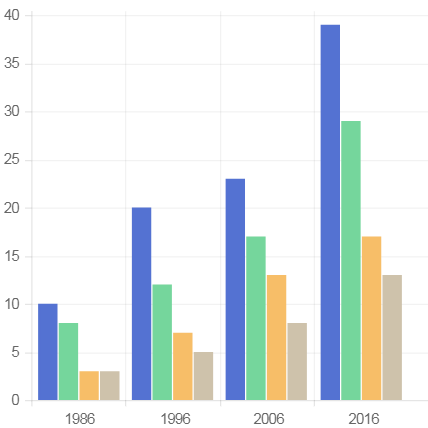
% Atheists in U.S. by age (Blue: ages 18-29; Green: 30-49; Gold: 50-64)
According to American Atheists, which has ‘more than 170 local affiliates nationwide’ in the United States, it has ‘392,000 members and supporters’ as of September 2017; and states that “Americans who are Atheists – 26%.” Additionally, they report, “almost 40% of Americans under 30 are now non-religious. Our community is the fastest growing religious demographic in all 50 states.”

According to international survey data published in the Oxford Handbook of Atheism (2016), there are about a half billon (500 million) atheists and agnostics worldwide. They listed the top 25 countries by percentage of atheist/agnostic as Czech Republic (55%, 4.65 million); France (41%, 20M); Sweden (39%, 2.8 M); Germany (36%, 24.6M); Netherlands (34%, 4.3 M); Belgium (34%, 2.9M); Denmark (32%, 1.4M); Norway (32%, 1.15M); United Kingdom (30%, 14.6M); South Korea (28%, 10.4M); Japan (28%, 29.8M); Finland (28%, 1.2M); New Zealand (28%, 866,000); Hungary (27%, 2.3M); Australia (26%, 5.1M); Spain (21%, 7.6M); China (18%, 235M); Russia (17%, 19M); Taiwan (15%, 2.7M); Uruguay (14%, 232K); Italy (13%, 6.7M); Israel (11%, 525K); United States (8%, 18.6M); Mexico (6%, 3.7M) and India (2.5%, 27.7M).
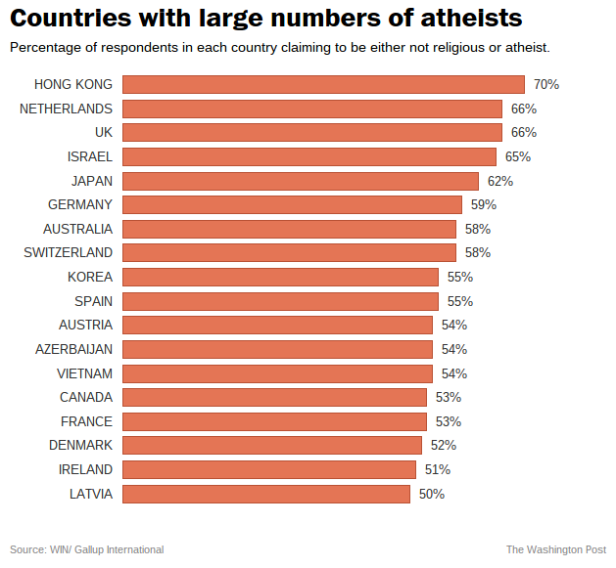
WIN Gallup International (2013; “Losing our Religion…”)
Although the atheism data shows a dramatic 4x increase in less than 2 generations, this does not look at the non-religious. According a 2015 Gallup International Survey and WI Network of Market Research, China has the most non-religious and atheists at about 90% of all Chinese. They also report only 1 in 8 Swedes regularly attend religious services; and they put Sweden at 76% non-religious/atheists; closely followed by Czech Republic at 75%; then Hong Kong (70%) and the Netherlands and the U.K. tied at two-thirds of their population (66%).
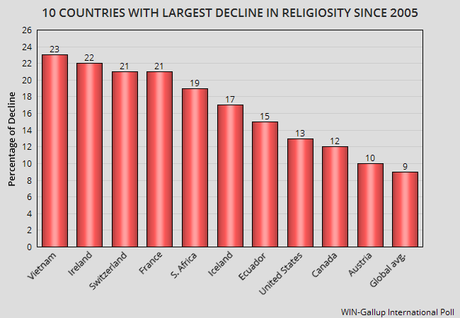
Christians: according to PewResearch.org, “Christians remain world’s largest religious group, but they are declining in Europe (←Article title; 4/2017).” The article states the in 2015, Christians made up 31% of the Earth’s 7.3 billion people or 2.3 billion (Muslims were 1.8 billion; 24%; Hindus 1.1 billion; 15%; and unaffiliated at 16% or 1.2 billion).


These figures do not line up with WIN Gallup’s 36% non-religious and atheists; and it does not take into account those with profess a religion who do not practice it or believe in its major doctrines. This is the case for Christians (especially in South and Central America), Muslims (especially under ISIS and in countries like Iran, North Sudan or Saudi Arabia), and younger Hindus now using the internet and social media. TheTruthSource speaks to these issues in: Young Hindus in India don’t believe in Supreme God and Forced to be Muslim
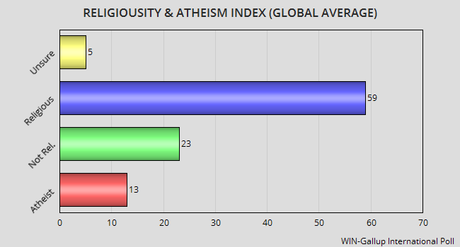
In the Quantitative Analysis: the World it is reported in great detail how the world population breaks down closer to about 23% Christian, 24% Muslim, 14% Hindu, 6% Buddhist and about 45% to 60% non-religious (including atheists, agnostics, and many listed as Christian, Muslim (Islam), Hindi, and Buddhist; as well as others that are said to follow Tribal, folk and other religions). Moreover, the following article shows Why the Generation Z Population will be Non-religious
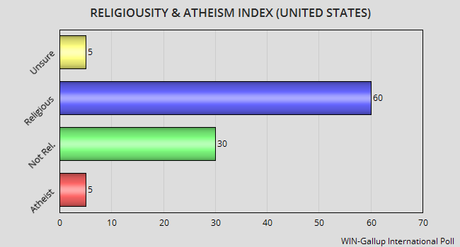
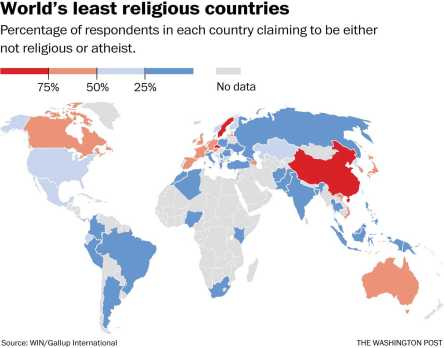
(Russia was over 35% atheists and non-religious in 2010; above does not reflect that)
